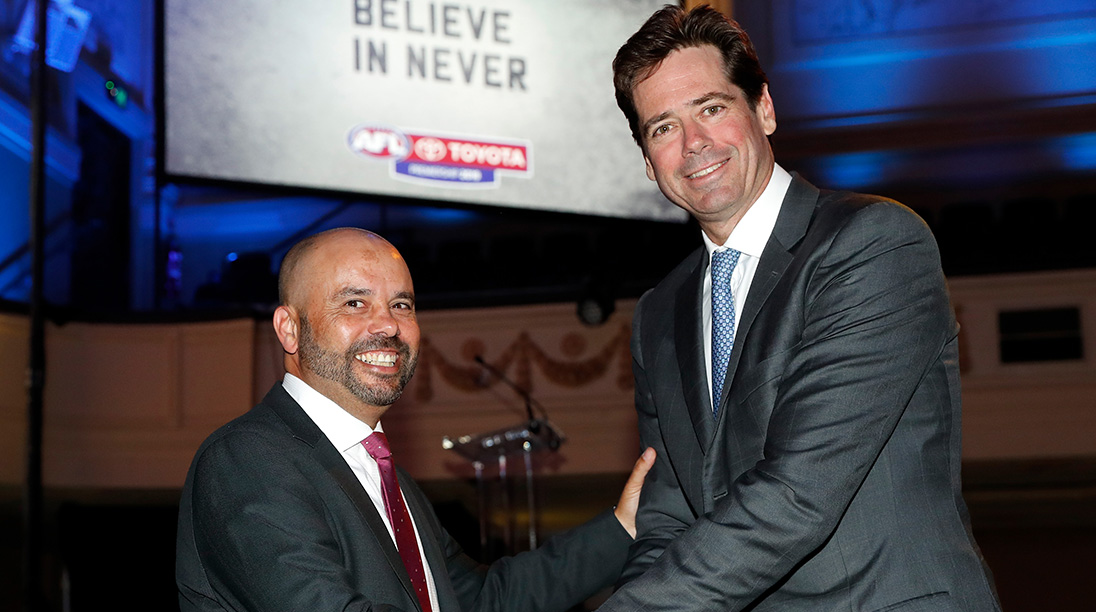Toyota has signed a deal that upgrades the $16 million sponsorship agreement it signed with the Australian Football League in 2015 by agreeing to pay a purported $18.5 million a year to the AFL until 2023.
Based on the reported amount, Toyota leapfrogs Kia’s circa-$16 million annual sponsorship of the Australian Open tennis tournament.
But Toyota Australia is being coy about the exact amount, saying the $18.5 million mentioned is incorrect – yet it will not release the actual sponsorship figure “for contractual reasons”.
A spokesman said: “What I can say is that number ($18.5 million) is not correct.”

Australia Chief Marketing Officer Wayne Gabriel and AFL CEO Gillon McLachlan
Whatever the amount, the latest deal continues Toyota’s longstanding marketing tradition of using large buckets of money to buy a place in front of key audiences and put strict conditions and key performance indicators on what the money delivers at all levels of the community.
Toyota Australia chief marketing officer Wayne Gabriel told GoAutoNews Premium that its marketing program places emphasis on sport, both at the elite and grassroots levels, because “sport has a huge impact on society”.
“Sport brings the community together and is a vital fabric of society,” he said.
“It teaches young Australians a lot about values such as responsibility, teamship, and can solve some of our biggest challenges including obesity and mental wellbeing.
“We see grassroots football as being really important for society and our role is contributing in giving back to the community.”
In Australia, Toyota is the principal sponsor of various teams and sporting events including the AFL and WAFL, the Adelaide Crows, North Queensland Cowboys, national wheelchair basketball and, on the global stage, the Olympic and Paralympic Games.
Underlying the sponsorship agreements is a list of key performance indicators (KPIs) that Toyota has used since the 1990s when it first started supporting the Adelaide Crows.
Mr Gabriel said that KPIs were an essential part of its sponsorship agreements but that they had changed.

“There is not one KPI – there are now a dozen or more,” he said.
“There have been more KPIs added recently and that’s because our plans and expectations of sponsorships have changed.
“We have been with the AFL for 20 years, so you can’t expect the same outcomes – otherwise you’re not adding value to the brand. So we have evolved the KPIs and what we pick and choose and how we implement these sponsorships – in all our sponsorships, not just the AFL – will depend on what we see on an immediate or future requirement for us to achieve.”
Mr Gabriel said that some of the changes to KPIs included acknowledging the cultural changes in society.
“So we value and support diversity and inclusion and our goal is to support areas of the game that don’t get the exposure of the mainstream media,” he said.
“From a commercial point of view it allows us to connect with the buying public better than perhaps the elite game.
“If you look at weekends in sport, it brings the community together with children and parents and volunteers – it’s the fabric of society and supporting that and allowing the sports to flourish is not just a nice thing to do, it’s an obligation for most big brands to support.”
The signing of the sponsorship agreement with the AFL has not affected other sponsorship deals and Mr Gabriel said he sees no change to that in the future.
“We have not reduced sponsorship in any other areas or activities and in fact with the Australian Olympic and Paralympic Games, we have increased our support,” he said.
“We see sport as a growing trend. Look at TV audiences: there’s a lot of things impacting media and there is so much choice. But sport does not have the downward trends of other sectors in the media.
“We see there is a great opportunity in exposure and involvement with community on both elite and grassroots levels.
“It’s not only football. The Toyota 86 racing series is not the elite level of motorsport – it’s grassroots motorsport,” he said.
“From a marketing perspective, our sponsorship program covers both the elite side of sport and the social and community level of grassroots sport.”
Mr Gabriel said that when Toyota exited manufacturing in Australia, there was only a slight evolution in marketing.
“Now we would support more generic things, though always with an Australian flavour.”
By Neil Dowling and John Mellor













 Read More: Related articles
Read More: Related articles

